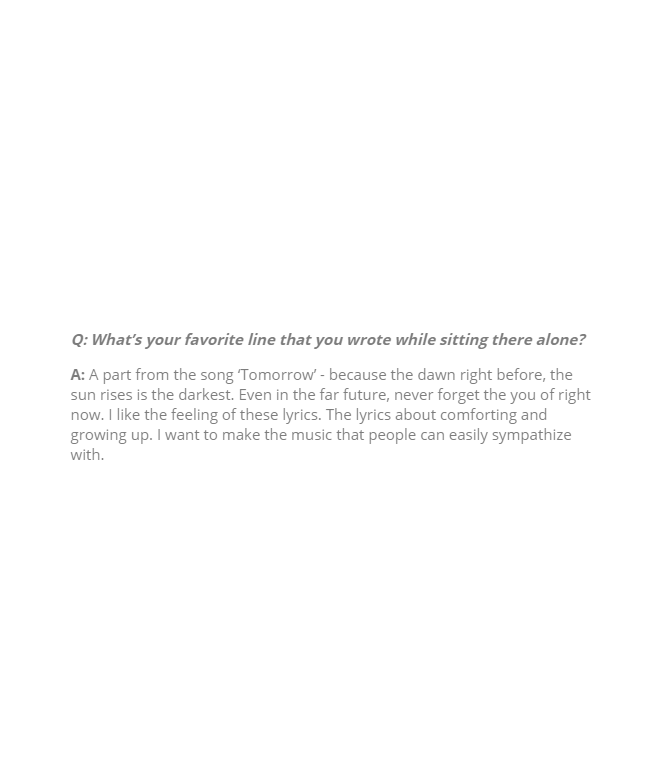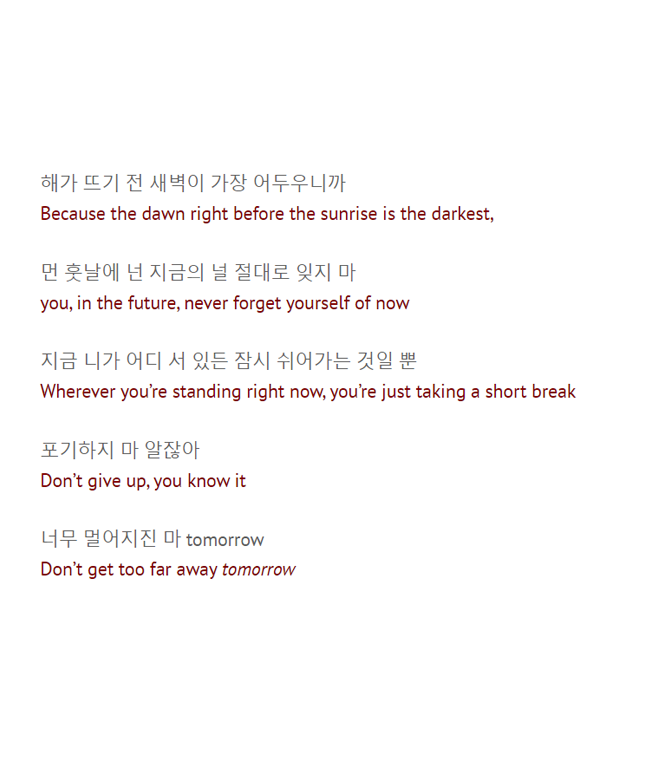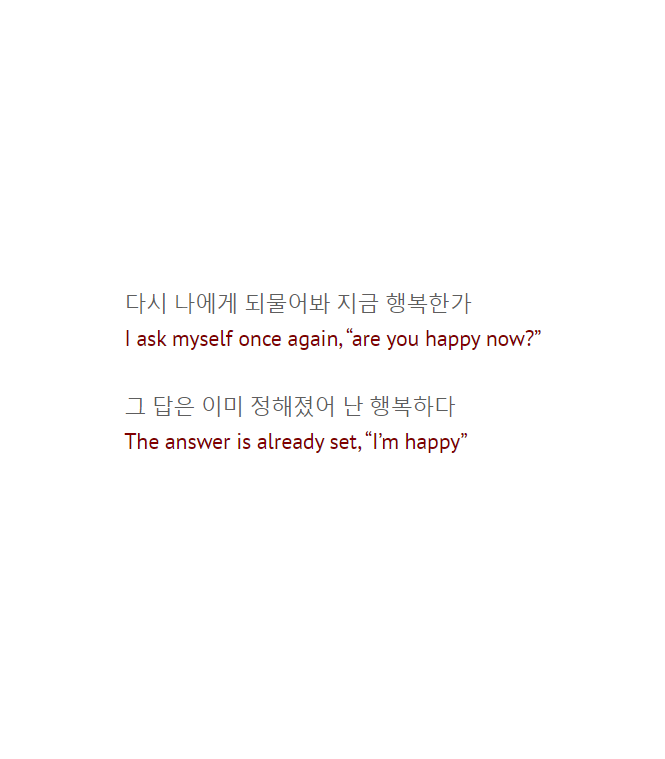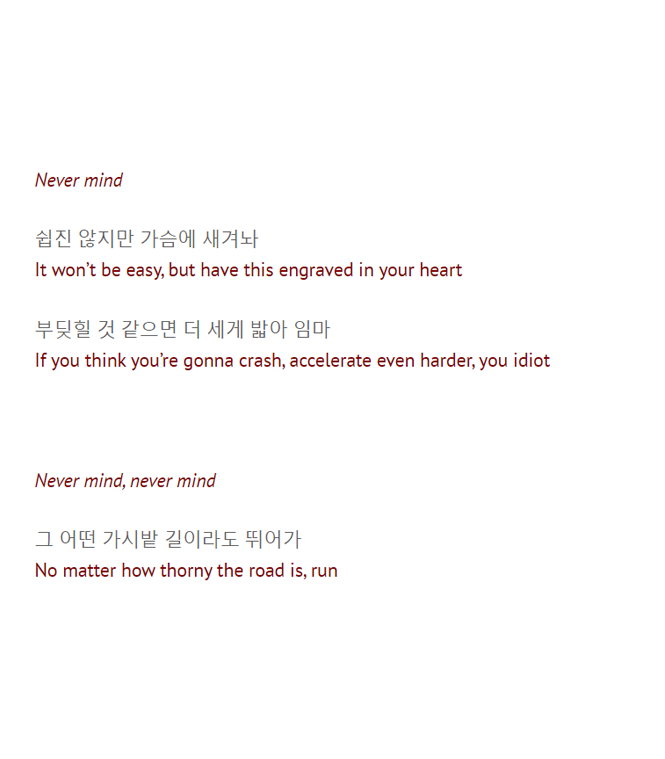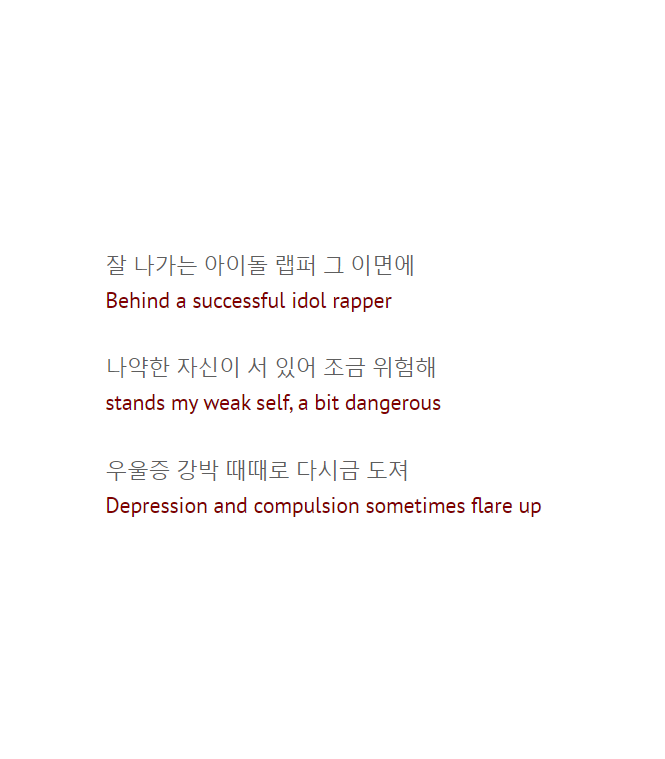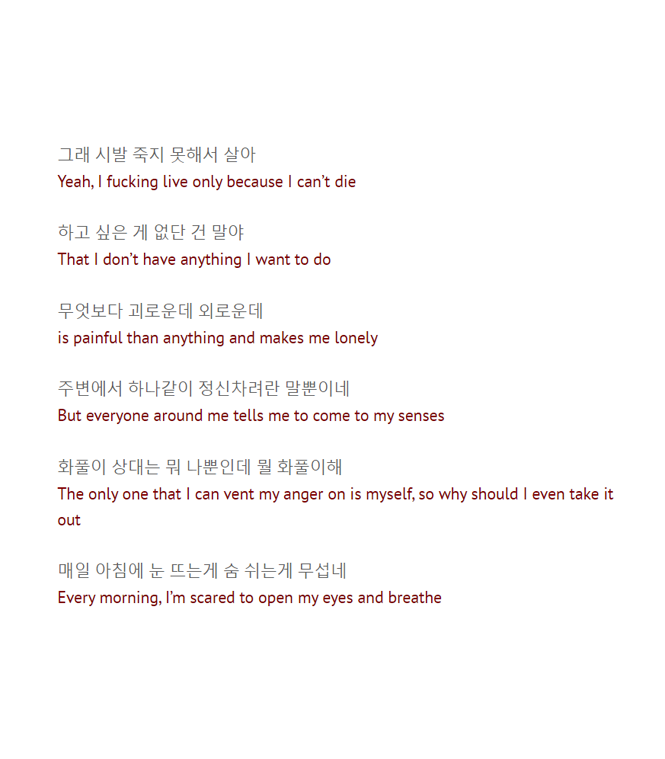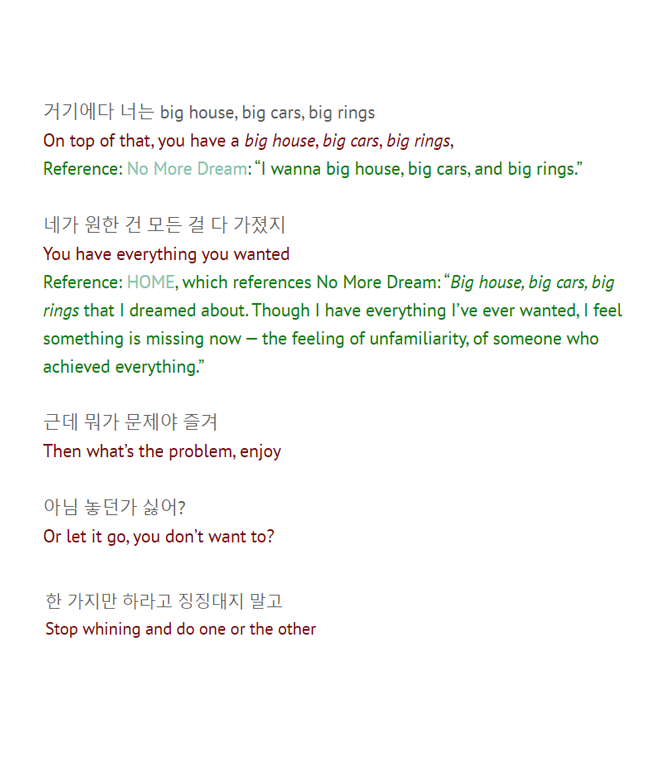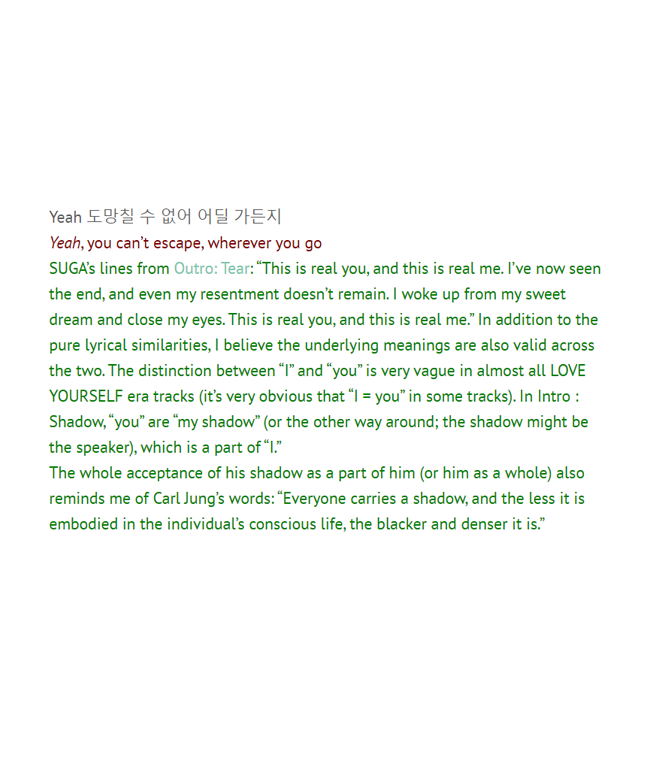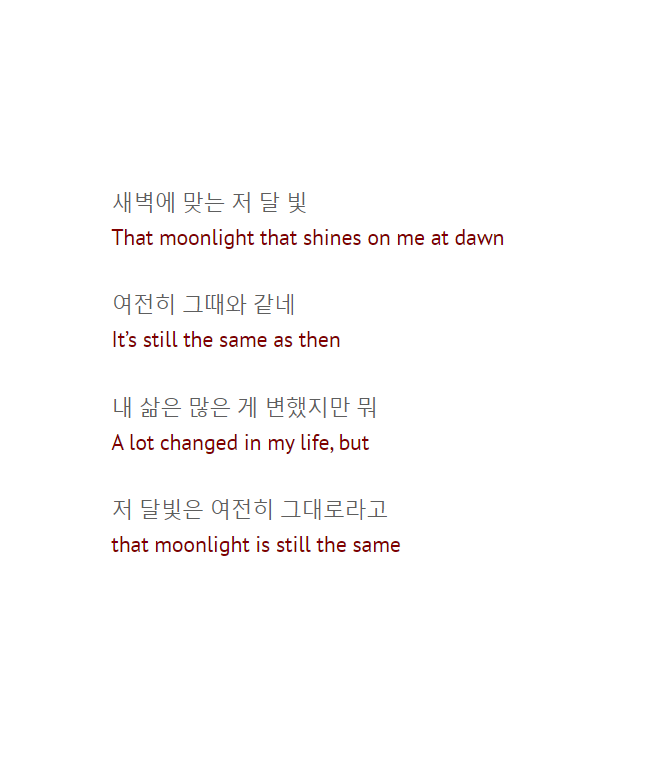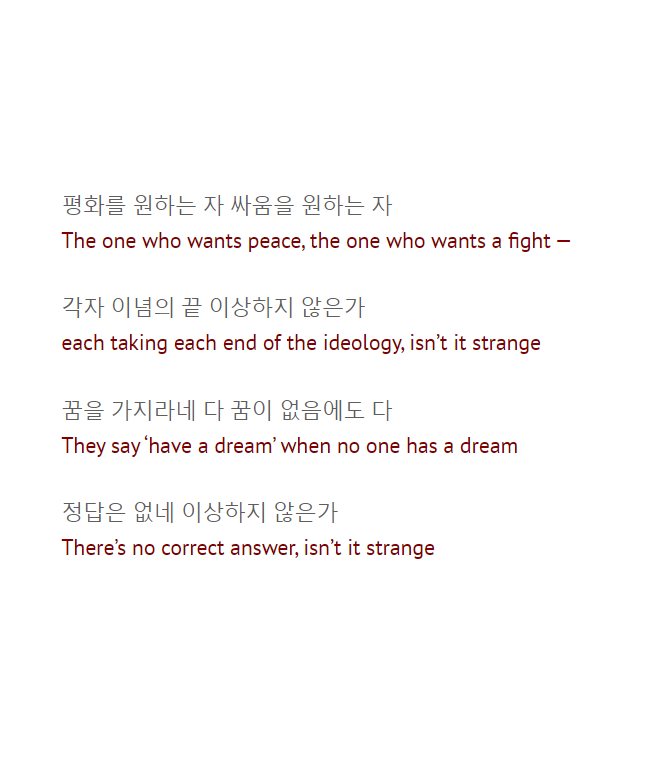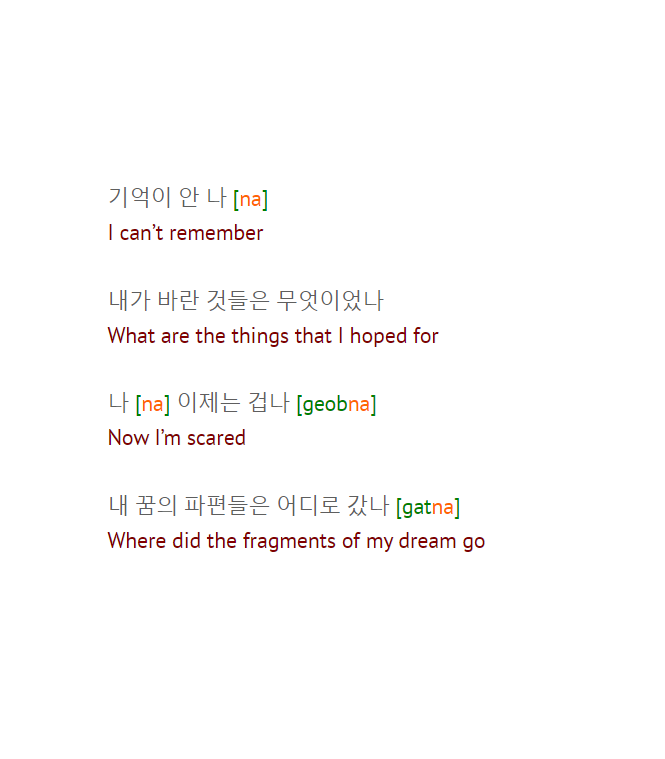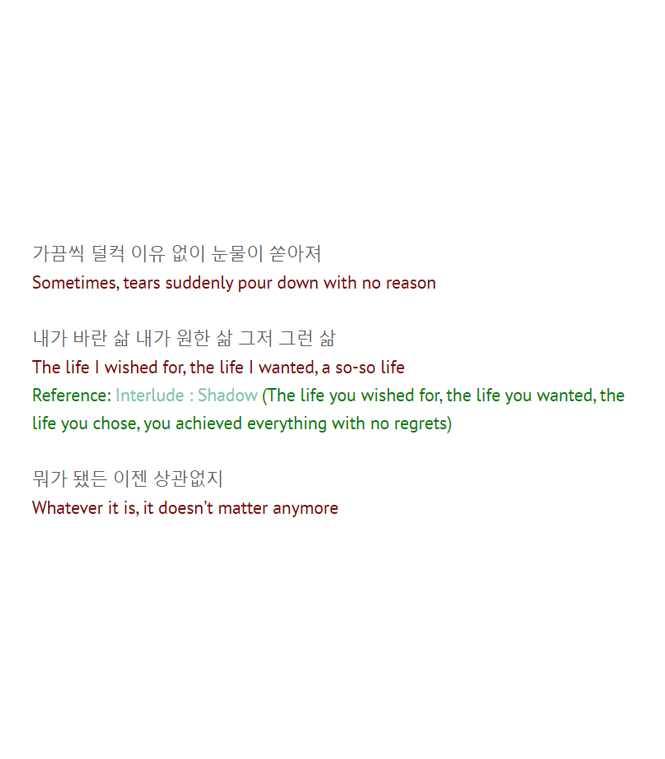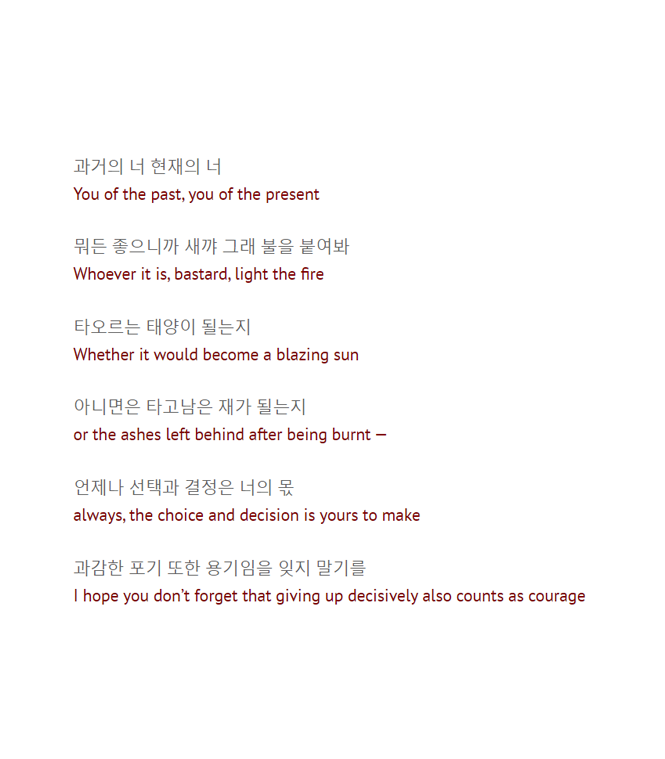Let’s get into it!
Generally, Yoongi is someone who wants to write hopeful music, he’s said this multiple times, and he also predominantly considers dreams, whether he’s pursuing them, contemplating them, or discussing their absence.
Generally, Yoongi is someone who wants to write hopeful music, he’s said this multiple times, and he also predominantly considers dreams, whether he’s pursuing them, contemplating them, or discussing their absence.
He’s very aware that dreams and hope are a social issue as well, to have a dream or follow a dream. It relates to more than just music, it’s a general outlook, but he turns to this often in his writing.
From Tomorrow onwards, dreams are the core of Yoongi’s lyrics. He points to the dreams being what grounds you, what takes you further, urges others and himself not to give them up, not to let them get too far away.
Here, already, the dream is followed blindly, with the flow of things. This kind of mindset comes up in D-2 as well, but it’s a little less dream-specific there. Here, however, everything hinges on the dream, on the dawn coming with it.
The dream is surrounded with hope – something that’s furthered in Intro: HYYH. Music is something that makes Yoongi laugh, feel relief, makes him dream in earnest. Dreaming is equal to breathing at this point, and he’s ready to risk it all for his dream.
To have that amount of hope and trust in oneself is incredible, to be able to admit that this is what makes you happy and follow it up with the courage to pursue your passion fully.
Yoongi is aware that the pursuit matters, it’s so easy to give up otherwise. And in Intro: Nevermind, that pursuit is the main theme. It’s the sprint towards a dream, accelerating every time you feel like you’re about to crash, because you believe you can keep pursuing it.
All of these songs are quite hopeful as well, there’s always the set belief that the dream will come true, that the dark sides of it are simply temporary. Which is why, when reaching AgustD, the initial shift into hopelessness is insanely powerful.
Yoongi completely subverts our perception of the dream. Whereas before, when he spoke in more general terms, he was able to focus on the hope surrounding dreams, on the sides that motivate and drive you, he is now showing us what dreams take from us.
The thread on sacrifice in his lyrics speaks to some of this, but really it reaches a whole other level when you connect the sacrifices to his perception of dreams and hope. https://twitter.com/yoongiteas/status/1293597854917959683?s=20">https://twitter.com/yoongitea...
In Give It To Me, he displays the greed, the hunger that comes with pursuing your dreams for so long. He’ll take any form of it, any form of movement forward. And he protects his dream, his success, threats or disdain against it makes him volatile.
724148 gives us details to the pursuit that has made him so protective. It shows us that dreams aren’t easy, you have to sacrifice a lot, work a lot. You have to earn money, have to do everything at once – school, work, music.
He’s displaying the complexities behind a dream, not because he wants to discourage dreams though, but to be transparent about his own struggles with it. Because in any case, there will be struggles.
140503 at dawn then shows that even when slowly reaching success, slowly beginning to accomplish your dream, it’ll come at a cost, and you might not be happy at all. The temporary darkness might not be so temporary after all.
In The Last, his dreams are overtaken by his greed, his self-destructive thoughts. It’s a vulnerable moment where Yoongi shifts from a simple ‘hey, there are downsides’ to showing us that the dream can transform into self-destruction quite quickly.
It outgrows you until you really have no control over it, rather it controls you. However, for the first time on the mixtape, we get to see the hopeful side of it too. With the concept of ‘Han’, Yoongi is inherently involving hope into the mixture.
Hope that there will be a better future, hope that as his dream becomes fulfilled he will be able to live fully. I think this hopefulness, at the end of a song that shows us how quickly dreams become nightmares, is the essence of Yoongi’s songwriting.
An incredibly important song to follow up with is Interlude: Dream, Reality. The only lyric here is the word “dream” repeated over and over. Just dream.
In that sense, Yoongi is really leaving it up to the listener. What is a dream to you? What is your definition of it? Most importantly, how do you experience it?
He provides his own experience in the instrumental, but he also lets us ponder every single interpretation – it can be finding a dream, wanting one, thinking about dreams until you’ve familiarised yourself with every interpretation.
And then you’re free to release it into the world, just like he has. The dream here is gentler, softer, it relies on a release of struggles – just like Yoongi’s dream of a mixtape is finally fulfilled through a musical release of his struggles.
You get to chew on the word dream until it loses meaning, but Yoongi’s got your back, sweeping in with So Far Away.
This song is an incredibly powerful way to end a mixtape because it not only deals with hope and dreams, but also dreamlessness. It involves questioning why you are standing still, perhaps you have to stand still to find a dream?
Besides this, it considers the anxiety and isolation that come from dreamlessness and the lack of a common societal dream. This is also clear in the second verse, where he feels purposeless and useless because there isn’t anything he wants to do.
The only dream that exists is that of flying away, leaving the world that would make you dream another dream fade away. The wish that the self disappears, that everything is a mirage, and all you’re left with is an uncontrollable fall.
In the end, the mixtape ends with hope. Yoongi defines the dream to himself, but it’s not the tangible dream you expect, such as making music or going to college.
Instead, it’s the dream of having a dream. The dream that your dream will reach you at your beginning and end, that it will be generous, that it will bloom after all your hardships and result in a prosperous future.
In the case that the dream already exists, the hopes are the same, and they are general enough to apply to both situations. Here is Yoongi’s hope, passed onto others. The dream, whatever it is, is yours to define, and he only hopes it will bring you joy.
First Love then takes this general statement and applies it to Yoongi himself. It’s almost a complete return to his origins, to the love he feels for music, the reason why his dream developed and how he struggled letting it go and picking it back up.
I think often, we view dreams with very strict criteria. But Yoongi, in both AgustD and First Love refuse to accept that. A dream has many definitions, it fluctuates. Just because you leave one dream and pick another doesn’t make it less worthy.
In that way, Yoongi’s lyrics on dreams are the most hopeful. Song Request gives us this definition quite clearly, if you take it as Yoongi speaking from the perspective of his music and what he wants it to represent.
His perception of dreams keeps evolving in SUGA’s Interlude as well. His dreams have been largely realized at this point, and he’s now faced with the aftermath. What do you have when your dream is accomplished?
Sometimes, dreams are better kept as dreams, as motivators and drivers. In the end, you keep going without one too, though. You still crash into life, still survive and move forward, but you get to find new dreams to keep you going.
But it’s a continuous struggle. In Shadow, Yoongi lists the things he wants from life, a list that first seems like dreams, but then turns into a list of greed when the song shifts into its darker sound. Notice that in the second list, the phrase "I got a big dream" is gone.
What is especially significant is the realization that the shadow created by the pursuit of one dream never goes away, despite the excitement at reaching your aspirations. It is always there, taunting you.
When you achieve the markers that mean your dream is complete and suddenly feel lost, it haunts you saying ‘isn’t this what you wanted?’, ‘why don’t you just keep going?’. The dream becomes a nightmare, in a similar sense to The Last.
However, the nightmare here is larger and fed by a fulfilled dream, while you now have no new big dream to get you through. And in the face of a lack of dreams, Yoongi shows us that the way forward is acceptance.
Doolset mentions Outro: Tear in their translation note, specifically the lyric “I woke up from my sweet dream and close my eyes. This is real you, and this is real me.”
Waking up from the dream you’d been pursuing you must now close your eyes and reflect, discover the relationship between the dichotomies that live in you. This is how you gain acceptance of the fact that not having a dream is brave as well.
It is brave, because you are facing the world without a filter, without the sweetness of dreams, rather looking at it plainly. This is the stage that has been set for the release of D-2.
Right off the bat, in Moonlight, we get to see that Yoongi takes dreams as a sign of youth. It’s something of a Peter Pan world, a youthful pursuit. As you grow older, the dreams fade, you begin to question yourself.
But there is a constant, something you love, a source of cooler light, moonlight, a more peaceful light that isn’t a raging sun of a dream. This continues the thought that dreams don’t have to consume you to be real.
All you have to do is keep going, keep running and progressing with the things you love, even if there is no longer an overarching dream.
In Strange, he then turns to the societal aspect of dreams. The way money will give you hope for success and take your dream in return. The promotion of dreams when most people in this world cannot have a dream.
It’s a reframing in the sense that he’s no longer expecting everyone to have dreams, to follow dreams. They’re not always possible, they’re not always something you can have the luxury of having either.
28 sets this to a personal level – he shows us where this conclusion has come from. His younger aspirations and his dream having been fragmented, his heart feels different, his youth feels faded. He no longer needs his dream to be able to breathe.
There’s a tangible introduction of how grandiose dreams and successes don’t have to be what you want in the end, they’re equally important to the tiny things. And it’s a hopeful thing to say after Strange.
Because Strange feels a tiny bit like there are no answers. Like all we have are questions, even when it comes to dreams. But in 28 Yoongi comforts, gives hope, even when lacking a dream.
Burn It comes in and we see the burning of old dreams in favour of the new, “giving up decisively also takes courage” is a line that encompasses the shift in mindset surrounding dreams from the beginning of Yoongi’s work until now.
When you have a consuming dream it’s difficult to understand how others don’t. But when you accomplish that dream, or lose it, and you’re suddenly left without one, you realize many aspects of that mindset don’t apply.
In the end, letting go could also bring you a new blazing sun – a new pursuit, even of little things, that will make you happy. In People, Yoongi tells us to just go with the flow, even if we fail, even if we have regrets.
It’s an extremely hopeful song, even if you’re failing or regretting, even if you want something different, that’s life. It will change, at some point, everything passes anyway.
Honsool backtracks a little bit, shows us that struggling with dreams and hope is still something that happens to everyone. It aligns with People in that way, gives us a display of how good times pass into bad times pass into good times again.
To be disillusioned with your own dreams and life is natural. But what matters is that when your dreams go flying into the void instead of into the sky, you can always resurface. That’s where Set Me Free comes in.
You can always set yourself free from the void, pull yourself up and hope that the monotony of it ends, that there is a light at the end of the tunnel. Hope is what you have left.
Interviews used!
Wings Concept Book (trans syubbae): https://twitter.com/glosshypegirl/status/1215504194670432257
Marie">https://twitter.com/glosshype... Claire September 2016 (trans KIMMYYANG)
https://kimmy-trans.tumblr.com/post/149233312206/marie-claire-september-issue-2016-bts-sugas
Grazia">https://kimmy-trans.tumblr.com/post/1492... September 2016 (trans KIMMYYANG)
https://kimmy-trans.tumblr.com/post/149224829116/grazia-september-issue-2016interview-bts-suga">https://kimmy-trans.tumblr.com/post/1492...
Wings Concept Book (trans syubbae): https://twitter.com/glosshypegirl/status/1215504194670432257
Marie">https://twitter.com/glosshype... Claire September 2016 (trans KIMMYYANG)
https://kimmy-trans.tumblr.com/post/149233312206/marie-claire-september-issue-2016-bts-sugas
Grazia">https://kimmy-trans.tumblr.com/post/1492... September 2016 (trans KIMMYYANG)
https://kimmy-trans.tumblr.com/post/149224829116/grazia-september-issue-2016interview-bts-suga">https://kimmy-trans.tumblr.com/post/1492...
Stream AgustD https://abs.twimg.com/emoji/v2/... draggable="false" alt="🤍" title="Weißes Herz" aria-label="Emoji: Weißes Herz"> https://open.spotify.com/album/6GbiSEYL78RDLpxoxkWavo?si=PGJxENDLQjavOJoMx-TGTA">https://open.spotify.com/album/6Gb...
https://abs.twimg.com/emoji/v2/... draggable="false" alt="🤍" title="Weißes Herz" aria-label="Emoji: Weißes Herz"> https://open.spotify.com/album/6GbiSEYL78RDLpxoxkWavo?si=PGJxENDLQjavOJoMx-TGTA">https://open.spotify.com/album/6Gb...
Find the rest of AgustD Week celebrations here! https://twitter.com/yoongiteas/status/1292874000104923138?s=20">https://twitter.com/yoongitea...

 Read on Twitter
Read on Twitter
